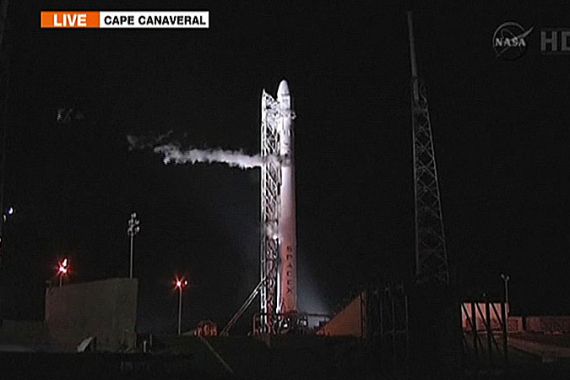Private space mission aborted at last second
SpaceX rocket was to be first private spacecraft sent to space station, signaling end of NASA’s industry dominance.

The scheduled launch of a private rocket from the Cape Canaveral space centre in Florida has been dramatically aborted at the last second apparently due to a possible problem with one of the rocket’s engines.
SpaceX’s Falcon 9 rocket was due to launch on Saturday, sending its Dragon capsule on a mission to the International Space Station which would have marked the end of NASA’s decades-long industry dominance and the debut for commercial space operators.
Keep reading
list of 4 itemsChina trying to develop world ‘built on censorship and surveillance’
Why does NASA want a time zone on the moon?
Could shipping containers be the answer to Ghana’s housing crisis?
But the rocket failed to lift off as the countdown reached zero.
“The initiation sequence had started but there was a cutoff,” said George Diller, NASA commentator, who added that launch computers had detected something was wrong with one of the limits on one of the rocket’s nine engines.
“The computer checks all of the engine telemetry,” said the spokesman on SpaceX’s live broadcast of the event. “We detected something was wrong with one of the limits” on one of the rocket’s nine engines.
A SpaceX spokesman said engineers would look into the causes, and the launch would not take place on Saturday.
Gwynne Shotwell, president of SpaceX, said later at a press conference that the engine controller noted a “high chamber pressure in engine five”.
“Software did what it was supposed to do, aborted engine five then we went through the remaining engine shutdown,” she said.
Next launch
Al Jazeera’s Andy Gallacher, reporting from Cape Canaveral, said the next window for a possible launch would be on Tuesday.
“They will be back all again on Tuesday to try again,” said Gallacher.
The SpaceX mission marks the first attempt to send a privately built spacecraft to the space station, where it plans to do a fly-under followed by a berthing in the following days, something so far achieved only by space agencies from Russia, Europe and Japan.
SpaceX is the first of several US competitors seeking to sending its own cargo-bearing spacecraft to the space station with the eventual goal of supplying the orbiting facility and eventually also sending humans into space.
“They say they want to get people on board by 2015,” said our correspondent, Gallacher.
SpaceX made history with its Dragon launch in December 2010, becoming the first commercial outfit to send a spacecraft into orbit and back.
The US has lacked the capacity to send vehicles to the space station since the retirement of NASA’s space shuttle last year, leaving Russia as the sole taxi for astronauts to the ISS until private industry can come up with a replacement.